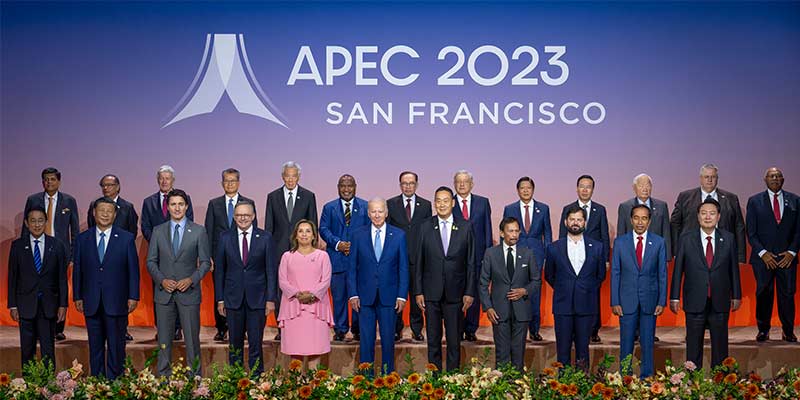- World
- Nov 18
What is Asia-Pacific Economic Cooperation (APEC)?
• Trade and foreign ministers from the 21 member economies of Asia-Pacific Economic Cooperation (APEC) renewed their commitment to bring benefits for the people in the region through inclusive economy and trade policies during the meeting in San Francisco, California, on November 16 & 17.
• The leaders agreed to the ‘Golden Gate Declaration’ at the conclusion of the meeting.
• It reaffirms the determination to deliver a free, open, fair, non-discriminatory, transparent, inclusive, and predictable trade and investment environment.
• Union Minister Piyush Goyal represented India, a guest economy, at the Informal Dialogue of Leaders’ of APEC on Sustainability, Climate, and Just Energy Transitions.
What is Asia-Pacific Economic Cooperation?
• The Asia-Pacific Economic Cooperation (APEC) is a regional economic forum established in 1989 to leverage the growing interdependence of the Asia-Pacific.
• APEC’s 21 members aim to create greater prosperity for the people of the region by promoting balanced, inclusive, sustainable, innovative and secure growth and by accelerating regional economic integration.
• APEC ensures that goods, services, investment and people move easily across borders.
Members facilitate this trade through:
i) Faster customs procedures at borders.
ii) More favourable business climates behind the border.
iii) Aligning regulations and standards across the region.
• For example, APEC’s initiatives to synchronise regulatory systems are key to integrating the Asia-Pacific economy. In such cases, a product can be more easily exported with just one set of common standards across all economies.
• The APEC mission and work remain guided by the commitment, as laid out in the Putrajaya Vision 2040 and the Aotearoa Plan of Action, to an open, dynamic, resilient, and peaceful Asia-Pacific community by 2040, for the prosperity of all people in the region and future generations.
• The word ‘economies’ is used to describe APEC members because the APEC cooperative process is predominantly concerned with trade and economic issues, with members engaging with one another as economic entities.
• APEC’s member economies are home to more than 2.9 billion people and make up over 60 per cent of global GDP.
Members of APEC:
• Australia
• Brunei Darussalam
• Canada
• Chile
• China
• Hong Kong
• Indonesia
• Japan
• South Korea
• Malaysia
• Mexico
• New Zealand
• Papua New Guinea
• Peru
• The Philippines
• Russia
• Singapore
• Chinese Taipei (Taiwan)
• Thailand
• USA
• Vietnam.
Each year a different member hosts the major APEC meetings.
India is not a member of APEC
• India applied for membership of APEC in 1991 on the basis of its geographic location, potential size of the economy and degree of trade interaction with the Asia-Pacific.
• However, at the 5th APEC Leaders’ meeting in Vancouver in 1997, a decision was taken to place a 10 year moratorium on expanding membership which continues informally till date.
• India is engaging with APEC member countries to develop a consensus on lifting the informal moratorium on accepting new members and to engage for India’s candidature for membership of APEC.
How APEC works?
• APEC operates as a cooperative, multilateral economic and trade forum.
• Member economies participate on the basis of open dialogue and respect for views of all participants.
• In APEC, all economies have an equal say and decision-making is reached by consensus.
• There are no binding commitments or treaty obligations. Commitments are undertaken on a voluntary basis and capacity building projects help members implement APEC initiatives.
• APEC’s structure is based on both a “bottom-up” and “top-down” approach.
• Four core committees and their respective working groups provide strategic policy recommendations to APEC leaders and ministers who annually set the vision for overarching goals and initiatives.
• The working groups are then tasked with implementing these initiatives through a variety of APEC-funded projects.
• Members also take individual and collective actions to carry out APEC initiatives in their individual economies with the assistance of APEC capacity building projects.
• Capacity building projects play an important role in helping translate APEC’s goals into reality. By enhancing members’ capacity through skills training and technological know-how, APEC-funded projects strengthen members’ readiness to adopt new initiatives from electronic customs processing to regulatory reform.
• APEC projects also target specific policy areas from enhancing small and medium enterprise competitiveness to facilitating the adoption of renewable energy technologies in the region.
• The APEC Secretariat is based in Singapore and operates as the core support mechanism for the APEC process. It provides coordination, technical and advisory support as well as information management, communications and public outreach services.
Manorama Yearbook app is now available on Google Play Store and iOS App Store


